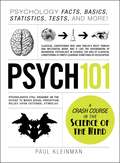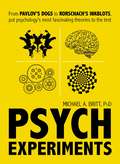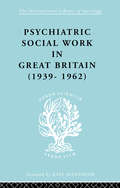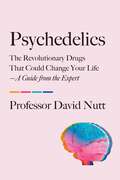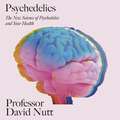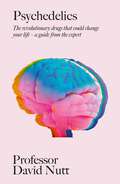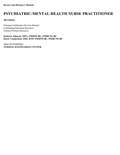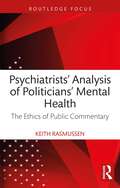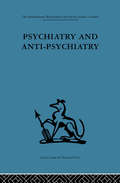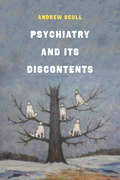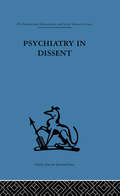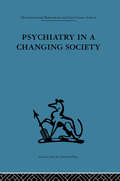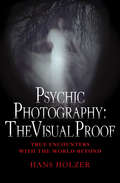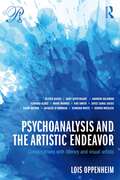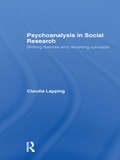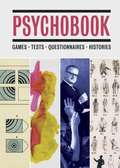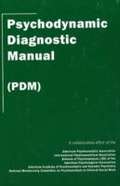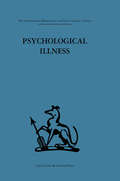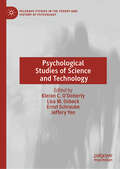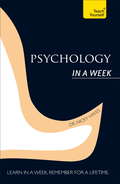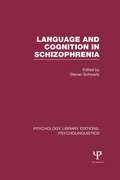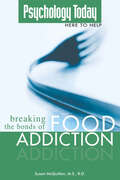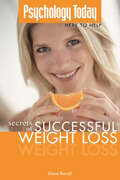- Table View
- List View
Psych 101: Psychology Facts, Basics, Statistics, Tests, and More! (Adams 101 Series)
by Paul KleinmanA hands-on approach to exploring the human mindToo often, textbooks turn the noteworthy theories, principles, and experiments of psychology into tedious discourse that even Freud would want to repress. Psych 101 cuts out the boring details and statistics, and instead, gives you a lesson in psychology that keeps you engaged - and your synapses firing.From personality quizzes and the Rorschach Blot Test to B.F. Skinner and the stages of development, this primer for human behavior is packed with hundreds of entertaining psychology basics and quizzes you can't get anywhere else.So whether you're looking to unravel the intricacies of the mind, or just want to find out what makes your friends tick, Psych 101 has all the answers - even the ones you didn't know you were looking for.
Psych Experiments: From Pavlov's dogs to Rorschach's inkblots, put psychology's most fascinating studies to the test
by Michael A BrittPsychology's most famous theories--played out in real life! Forget the labs and lecture halls. You can conduct your very own psych experiments at home! Famous psychological experiments--from Freud's ego to the Skinner box--have changed the way science views human behavior. But how do these tests really work? In Psych Experiments, you'll learn how to test out these theories and experiments for yourself...no psychology degree required! Guided by Michael A. Britt, creator of popular podcast The Psych Files, you can conduct your own experiments when browsing your favorite websites (to test the "curiosity effect"), in restaurants (learning how to increase your tips), when presented with advertisements (you'd be surprised how much you're influenced by the color red), and even right on your smartphone (and why you panic when you can't find it). You'll even figure out how contagious yawning works! With this compulsively readable little book, you won't just read about the history of psychology--you'll live it!
Psych Soc Work Gt Brit Ils 264: 1939-1962 (International Library of Sociology #3)
by Noel TimmsFirst published in 1998. Routledge is an imprint of Taylor & Francis, an informa company.
Psychedelics: The Revolutionary Drugs That Could Change Your Life—A Guide from the Expert
by Professor David NuttThe definitive guide to the science of psychedelics—"the perfect intro for anyone curious about psychedelics and MDMA&” (Ethan Nadelmann, founder and former executive director, Drug Policy Alliance)--and how they can impact our health by world-renowned, leading authority Professor David Nutt. We are on the cusp of a major revolution in psychiatric medicine and neuroscience. After fifty years of prohibition, criminalization and fear, science is finally showing us that psychedelics are not dangerous or harmful. Instead, when used according to tested, safe and ethical guidelines, they are our most powerful newest treatment of mental health conditions, from depression, PTSD, and OCD to disordered eating and even addiction and chronic pain. Professor David Nutt, one of the world's leading Neuropsychopharmacologists, has spent 15 years researching this field and it is his most significant body of work to date. In 2018, he co-founded the first academic psychedelic research center - underpinned by his mission to provide evidence-based information for people everywhere. It revived interest in the understanding and use of this drug in its many forms, including MDMA, ayahuasca, magic mushrooms, LSD and ketamine. The results of this have been nothing short of ground-breaking for the future categorization of drugs, but also for what we now know about brain mechanisms and our consciousness. At a time where there is an enormous amount of noise around the benefits of psychedelics, this book contains the knowledge you need to know about a drug that is about to go mainstream, free from the hot air, direct from the expert. Are you ready to change your mind?
Psychedelics: The revolutionary drugs that could change your life – a guide from the expert
by Professor David NuttThe definitive guide to psychedelics, science and our health by a world-renowned, leading authority, Professor David Nutt.We are on the cusp of a major revolution in psychiatric medicine and neuroscience. After fifty years of prohibition, criminalisation and fear, science is finally showing us that psychedelics are not dangerous or harmful. Instead, when used according to tested, safe and ethical guidelines, they are our most powerful newest treatment of mental health conditions, from depression, PTSD, and OCD to disordered eating and even addiction and chronic pain.Professor David Nutt, one of the world's leading Neuropsychopharmacologists, has spent 15 years researching this field and it is his most significant body of work to date. In 2018, he co-founded the first academic psychedelic research centre - underpinned by his mission to provide evidence-based information for people everywhere. It revived interest in the understanding and use of this drug in its many forms, including MDMA, ayahuasca, magic mushrooms, LSD and ketamine. The results of this have been nothing short of ground-breaking for the future categorisation of drugs, but also for what we now know about brain mechanisms and our consciousness.At a time where there is an enormous amount of noise around the benefits of psychedelics, this book contains the knowledge you need to know about a drug that is about to go mainstream, free from the hot air, direct from the expert.Are you ready to change your mind?(P) 2023 Hodder & Stoughton Limited
Psychedelics: The revolutionary drugs that could change your life – a guide from the expert
by Professor David NuttWe are on the cusp of a major revolution in psychiatric medicine and neuroscience. After fifty years of prohibition, criminalisation and fear, science is finally showing us that psychedelics are not dangerous or harmful. Instead, when used according to tested, safe and ethical guidelines, they are our most powerful newest treatment of mental health conditions, from depression, PTSD, and OCD to disordered eating and even addiction and chronic pain.Professor David Nutt, one of the world's leading Neuropsychopharmacologists, has spent 15 years researching this field and it is his most significant body of work to date. In 2018, he co-founded the first academic psychedelic research centre - underpinned by his mission to provide evidence-based information for people everywhere. It revived interest in the understanding and use of this drug in its many forms, including MDMA, ayahuasca, magic mushrooms, LSD and ketamine. The results of this have been nothing short of ground-breaking for the future categorisation of drugs, but also for what we now know about brain mechanisms and our consciousness.At a time where there is an enormous amount of noise around the benefits of psychedelics, this book contains the knowledge you need to know about a drug that is about to go mainstream, free from the hot air, direct from the expert.Are you ready to change your mind?
Psychiatric-Mental Health Nurse Practitioner Review and Resource Manual
by Kathryn Johnson Dawn VanderhoefWritten by experts in psychiatric-mental health nurse practitioner practice, this book provides a clinical reference tool and certification examination preparation. This manual helps readers enhance critical thinking skills and identify strengths and weaknesses.
Psychiatrists' Analysis of Politicians' Mental Health: The Ethics of Public Commentary
by Keith RasmussenThis book discusses the validity, ethics, and usefulness of professional public commentary of politician’s mental health and provides an alternative model for professionals to do so in an ethical manner.Rendering public opinions about politician’s mental health, particularly when the professional has not conducted a first-hand assessment of the individual, can be problematic and unethical. This book reviews the legitimate methods of psychiatric and psychological evaluations, abuses of psychiatry, and ethical perspectives on publicly voicing opinions regarding public figures, and proposes an alternative assumption model for mental health professionals to render a public opinion. It is a great resource for practicing psychologists and psychiatrists to reflect on their own processes when examining the mental health of politicians.Students and trainees in the mental health sector will come away from this book with a better understanding of the ethical concerns inherent in commenting publicly on public officials’ mental health, and they'll find valuable guidance on how to do so in an ethical way.
Psychiatry and Anti-Psychiatry
by David CooperTavistock Press was established as a co-operative venture between the Tavistock Institute and Routledge & Kegan Paul (RKP) in the 1950s to produce a series of major contributions across the social sciences. This volume is part of a 2001 reissue of a selection of those important works which have since gone out of print, or are difficult to locate. Published by Routledge, 112 volumes in total are being brought together under the name The International Behavioural and Social Sciences Library: Classics from the Tavistock Press. Reproduced here in facsimile, this volume was originally published in 1967 and is available individually. The collection is also available in a number of themed mini-sets of between 5 and 13 volumes, or as a complete collection.
Psychiatry and Its Discontents
by Andrew ScullWritten by one of the world’s most distinguished historians of psychiatry, Psychiatry and Its Discontents provides a wide-ranging and critical perspective on the profession that dominates the treatment of mental illness. Andrew Scull traces the rise of the field, the midcentury hegemony of psychoanalytic methods, and the paradigm’s decline with the ascendance of biological and pharmaceutical approaches to mental illness. The book’s historical sweep is broad, ranging from the age of the asylum to the rise of psychopharmacology and the dubious triumphs of “community care.” The essays in Psychiatry and Its Discontents provide a vivid and compelling portrait of the recurring crises of legitimacy experienced by “mad-doctors,” as psychiatrists were once called, and illustrates the impact of psychiatry’s ideas and interventions on the lives of those afflicted with mental illness.
Psychiatry in Dissent: Controversial issues in thought and practice second edition
by Anthony ClareTavistock Press was established as a co-operative venture between the Tavistock Institute and Routledge & Kegan Paul (RKP) in the 1950s to produce a series of major contributions across the social sciences. This volume is part of a 2001 reissue of a selection of those important works which have since gone out of print, or are difficult to locate. Published by Routledge, 112 volumes in total are being brought together under the name The International Behavioural and Social Sciences Library: Classics from the Tavistock Press. Reproduced here in facsimile, this volume was originally published in 1980 and is available individually. The collection is also available in a number of themed mini-sets of between 5 and 13 volumes, or as a complete collection.
Psychiatry in a Changing Society
by S H Foulkes G Stewart PrinceTavistock Press was established as a co-operative venture between the Tavistock Institute and Routledge & Kegan Paul (RKP) in the 1950s to produce a series of major contributions across the social sciences. This volume is part of a 2001 reissue of a selection of those important works which have since gone out of print, or are difficult to locate. Published by Routledge, 112 volumes in total are being brought together under the name The International Behavioural and Social Sciences Library: Classics from the Tavistock Press. Reproduced here in facsimile, this volume was originally published in 1969 and is available individually. The collection is also available in a number of themed mini-sets of between 5 and 13 volumes, or as a complete collection.
Psychic Photography: The Visual Proof (True Encounters with the World Beyond #1)
by Hans HolzerProfessor Hans Holzer carefully examines historic photographic evidence of ghosts and paranormal activity, explaining which images contain convincing proof and which may be trickeryFor more than a century, psychic researchers have amassed a body of photographic evidence of the afterlife. Indeed, according to professor Hans Holzer, photography gives us one of the greatest tools in documenting souls that continue to exist among us after death. Here Holzer looks at the evidence of ghosts revealing themselves to us on film, and shares examples of psychic photographs, many of which were taken during séances.
Psychoanalysis and the Artistic Endeavor: Conversations with literary and visual artists (Psychoanalysis in a New Key Book Series)
by Lois OppenheimPsychoanalysis and the Artistic Endeavor offers an intriguing window onto the creative thinking of several well-known and highly creative individuals. Internationally renowned writers, painters, choreographers, and others converse with the author about their work and how it has been informed by their life experience. Creative process frames the discussions, but the topics explored are wide-ranging and the interrelation of the personal and professional development of these artists is what comes to the fore. The conversations are unique in providing insight not only into the art at hand and into the perspective of each artist on his or her own work, but into the mind from which the work springs. The interviews are lively in a way critical writing by its very nature is not, rendering the ideas all that much more accessible. The transcription of the live interview reveals the kind of reflection censored elsewhere, the interplay of personal experience and creative process that are far more self-consciously shaped in a text written for print. Neither private conversation nor public lecture, neither crafted response (as to the media) nor freely associative discourse (as in the analytic consulting room), these interviews have elements of all. The volume guides the reader toward a deeper psychologically oriented understanding of literary and visual art, and it engages the reader in the honest and often-provocative revelations of a number of fascinating artists who pay testimony to their work in a way no one else can. This is a unique collection of particular interest for psychoanalysts, scholars, and anyone looking for a deeper understanding of the creative process.
Psychoanalysis in Social Research: Shifting theories and reframing concepts
by Claudia LappingThe use of psychoanalytic ideas to explore social and political questions is not new. Freud began this work himself and social research has consistently drawn on his ideas. This makes perfect sense. Social and political theory must find ways to conceptualise the relation between human subjects and our social environment; and the distinctive and intense observation of individual psychical structuring afforded within clinical psychoanalysis has given rise to rich theoretical and methodological resources for doing just this. However, psychoanalytic concepts do not remain the same when they are rearticulated in the context of research. This book traces the reiteration and transformation of concepts in the psychoanalytic theory of Freud, Klein and Lacan, the social theory of Butler, Derrida, Foucault, Laclau and Zizek, and case studies of empirical research ranging from the classic Tavistock Institute studies to contemporary work in politics, gender studies, cultural studies and education. Each chapter explores one cluster of concepts: Melancholia, loss and subjectivity Overdetermination and free association Resistance, reflexivity and the compulsion to repeat Repression, disavowal and foreclosure Psychic defenses and social defenses Arguing against the reification of psychoanalytic concepts, Claudia Lapping suggests the need for a reflexive understanding of the play of attachments and substitutions as concepts are reframed in the contrasting activities of psychoanalysis and research.
Psychoanalytic Theories of Development: An Integration
by Phyllis Tyson Robert L. TysonThorough review of psychological development starting at infancy going through adulthood with emphasis on major developmental milestones.
Psychobook: Games, Tests, Questionnaires, Histories
by Lionel Shriver Wall Oison Mel Gooding Julian RothensteinWho knew a trip to the therapist could be so much fun, even aesthetically rewarding? Beyond sharing feelings or complaining about your mother, Psychobook reveals the rich history of psychological testing in a fascinating sideways look at classic testing methods, from word-association games to inkblots to personality tests.Psychobook includes never-before-seen content from long-hidden archives, as well as reimagined tests from contemporary artists and writers, to try out yourself, at home or at parties. A great ebook for the therapist in your life and the therapist in you, for anyone interested in the history of psychology and psychological paraphernalia, or for anyone who enjoys games and quizzes. Psychobook will brighten your day and outlook.
Psychodynamic Diagnostic Manual
by Alliance of Psychoanalytic OrganizationsThis manual is based on current neuroscience and treatment outcome studies that demonstrate the importance of focusing on the full range and depth of emotional and social functioning. Beginning with a classification of the spectrum of personality patterns and disorders found in individuals and then describing a profile of mental functioning that permits a clinician to look in detail at each of the patient's capacities, the entries include a description of the patient's symptoms with a focus on the patient's internal experiences as well as surface behaviors. Intended to expand on the DSM (Diagnostic and Statistical Manual of Mental Disorders)and ICD (International Statistical Classification of Diseases and Related Health Problems) efforts in cataloging the symptoms and behaviors of mental health patients, this manual opens the door to a fuller understanding of the functioning of the mind, brain, and their development.
Psychological Illness: A community study
by E J R PrimroseTavistock Press was established as a co-operative venture between the Tavistock Institute and Routledge & Kegan Paul (RKP) in the 1950s to produce a series of major contributions across the social sciences. This volume is part of a 2001 reissue of a selection of those important works which have since gone out of print, or are difficult to locate. Published by Routledge, 112 volumes in total are being brought together under the name The International Behavioural and Social Sciences Library: Classics from the Tavistock Press. Reproduced here in facsimile, this volume was originally published in 1962 and is available individually. The collection is also available in a number of themed mini-sets of between 5 and 13 volumes, or as a complete collection.
Psychological Studies of Science and Technology (Palgrave Studies in the Theory and History of Psychology)
by Lisa M. Osbeck Ernst Schraube Kieran C. O’Doherty Jeffery YenThis book provides a significant contribution to scholarship on the psychology of science and the psychology of technology by showcasing a range of theory and research distinguished as psychological studies of science and technology. Science and technology are central to almost all domains of human activity, for which reason they are the focus of subdisciplines such as philosophy of science, philosophy of technology, sociology of knowledge, and history of science and technology. To date, psychology has been marginal in this space and limited to relatively narrow epistemological orientations. By explicitly embracing pluralism and an international approach, this book offers new perspectives and directions for psychological contributions. The book brings together leading theorists and researchers from around the world and spans scholarship across a variety of traditions that include theoretical psychology, critical psychology, feminist psychology and social constructionist approaches. Following a historical and conceptual introduction, the collection is divided into three sections: Scoping a New Psychology of Science and Technology, Applying Psychological Concepts to the Study of Science and Technology and Critical Perspectives on Psychology as a Science. The book will interest interdisciplinary scholars who work in the space of Science and Technology Studies and psychologists interested in the diverse human aspects of science and technology.
Psychology In A Week: Teach Yourself
by Nicky HayesLearn in a week, remember for a lifetime!In just one week, this accessible book will give you knowledge to last forever. End of chapter summaries and multiple choice questions are all designed to help you test your knowledge and gain confidence. So whether you are a student or you simply want to widen your knowledge, you will find this seven-day course a very memorable introduction.Sunday: Learn how humans grow up in and adapt to a social environmentMonday: Discover what emotions are and what affects our state of mindTuesday: Consider why we are motivated to do what we doWednesday: Discover the Buddhist scriptures and learn how they are interpreted today.Thursday: Engage with evolutionary psychology and the role of genes. Think about what intelligence is and how it comes about.Friday: Discover the factors influencing the psychological development of children, adolescents and adults.Saturday: Explore what psychologists do and how
Psychology In A Week: Teach Yourself
by Nicky HayesLearn in a week, remember for a lifetime!In just one week, this accessible book will give you knowledge to last forever. End of chapter summaries and multiple choice questions are all designed to help you test your knowledge and gain confidence. So whether you are a student or you simply want to widen your knowledge, you will find this seven-day course a very memorable introduction.Sunday: Learn how humans grow up in and adapt to a social environmentMonday: Discover what emotions are and what affects our state of mindTuesday: Consider why we are motivated to do what we doWednesday: Discover the Buddhist scriptures and learn how they are interpreted today.Thursday: Engage with evolutionary psychology and the role of genes. Think about what intelligence is and how it comes about.Friday: Discover the factors influencing the psychological development of children, adolescents and adults.Saturday: Explore what psychologists do and how
Psychology Library Editions: Psycholinguistics (Psychology Library Editions: Psycholinguistics)
by Robert W. Rieber Doris AaronsonPsychology Library Editions: Psycholinguistics brings together as one set, or individual volumes, a series of previously out-of-print titles, originally published between 1970 and 1990. From a variety of academic imprints this set reflects the growth of psycholinguistics as a serious scientific discipline in its own right. It provides in one place a wealth of important reference sources from a wide range of authors expert in the field.
Psychology Today: Breaking the Bonds of Food Addiction
by Susan McQuillanFinally, freedom from food addiction! From Alpha Books and Psychology Today magazine comes expert advice that explains the whys and hows of food obsession and compulsive overeating. Readers will gain the background and tools needed to fashion a plan for happier, healthier living and help themselves out of compulsive overeating-starting right now. It also shows readers how to work out individual food issues, move beyond addiction, and maintain a healthy, lifelong relationship with food. More than 135 million Americans are estimated to be either overweight or obese American Journal of Clinical Nutrition reported that Americans spend nearly $45 billion annually on weight-loss products and services and the American Dietary Association indicates that 65% of all women are currently dieting or plan to start a diet in 2004
Psychology Today: Secrets of Successful Weight Loss
by Diana BurrellPsychology Today-changing the way readers think about losing weight. Written in the popular yet authoritative style of Psychology Today magazine, this groundbreaking book offers much more than a weight-loss program. It offers an understanding of the personal and social forces conspiring against healthy weight loss, conditions that make losing weight more difficult, an overview of every method-from Atkins to bariatric surgery-and sound advice on the importance of exercise and lifestyle changes.
